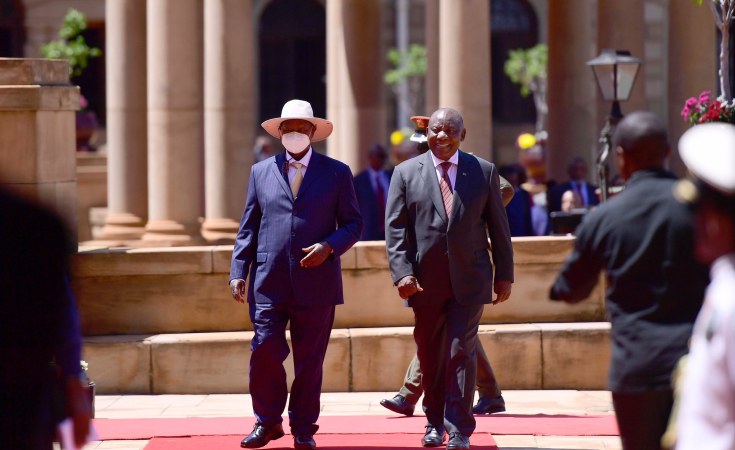There is room for improvement in South Africa and Uganda's trade relations, says President Cyril Ramaphosa.
"When it comes to trade and investment linkages between South Africa and Uganda there is certainly room for improvement," President Ramaphosa said on Tuesday.
The President was speaking at the SA-Uganda Business Forum held at Gallagher Estate in Midrand. Earlier in the day the President had received his Ugandan counterpart, President Yoweri Museveni on a State Visit at the Union Buildings.
President Ramaphosa said he hopes to see a strong showing from Ugandan and South African business at the inaugural Africa Free Continental Trade Area (AfCTA) Business Forum that will be hosted in Cape Town in a few months' time.
"It is particularly important that we inject vigour into the operationalisation of the African Continental Free Trade Area," said President Ramaphosa.
Last year saw a decline in volumes of trade between the two countries compared to the preceding year.
"In 2022, our two-way trade amounted to US$ 130 million, or just over R1.8 billion at the time. We should aim to more than double this to at least R4 billion within the next five years.
"South Africa is open to increasing the quantity and diversity of products we source from Uganda, because the success of intra-Africa trade hinges on each of us sourcing from one another and prioritising 'made and grown in Africa' products and services."
He spoke of the need to increase the level of reciprocal investment and increasing levels of trade.
"The confectionary industry is one example of opportunities for the creation of new value chains. Building relationships between major South African food producers and Ugandan suppliers of inputs like vanilla, coffee and cocoa could provide a route to expanding into the broader consumer goods market.
"Global food supply disruptions and changing climatic conditions have underscored the need for improved irrigation in farming."
President Ramaphosa said Uganda's infrastructure-build programme offers opportunities for partnership, drawing on the expertise of South African firms to help achieve Uganda's national objectives.
"Uganda's construction drive and increasing urbanisation offer substantial opportunities in the supply of electro-technical equipment by South African manufacturers," he said.
Addressing red tape
Challenges at ports and regulatory red tape that delay logistics and supply-chains would have to be addressed.
"When it comes to investment, we share a common aspiration to see more South African companies in Uganda and more Ugandan companies in South Africa. To unlock the potential, and ensure that Uganda benefits from the outward investment drive, we will need to deepen our collaboration to address the challenges and concerns facing investors.
"We are therefore implementing structural reforms in key network industries such as electricity, ports, rail, telecommunications and water," he said.
President Museveni spoke to the importance strengthening existing relations between the two countries.
"The discussions we had were aimed at ensuring that people are able to do business between the two countries. Signing agreements is not enough, we need to ensure that it happens," President Museveni said.
President Museveni said South African companies are playing a major role in the growth of Ugandan companies.
Meanwhile, Trade, Industry and Competition Minister Ebrahim Patel said that extensive discussions were held with the Ugandan delegation.
"South Africa is proud of the relations between with Uganda. During the discussions, a number of opportunities were unpacked," Patel said.
The earlier session at the Union Buildings saw the signing of a number of agreements.
The State Visit was aimed at consolidating bilateral relations between the two countries, with discussions between the two Heads of State encompassing political, economic, regional, continental and international issues.
South Africa's exports to the Republic of Uganda increased from R2.18 billion in 2017 to R3.12 billion in 2018.
The value of South Africa's imports from Uganda increased from R127 million in 2017 to R323 million in 2020.
Before the COVID-19 pandemic, South Africa had more than 70 companies operating in Uganda.


